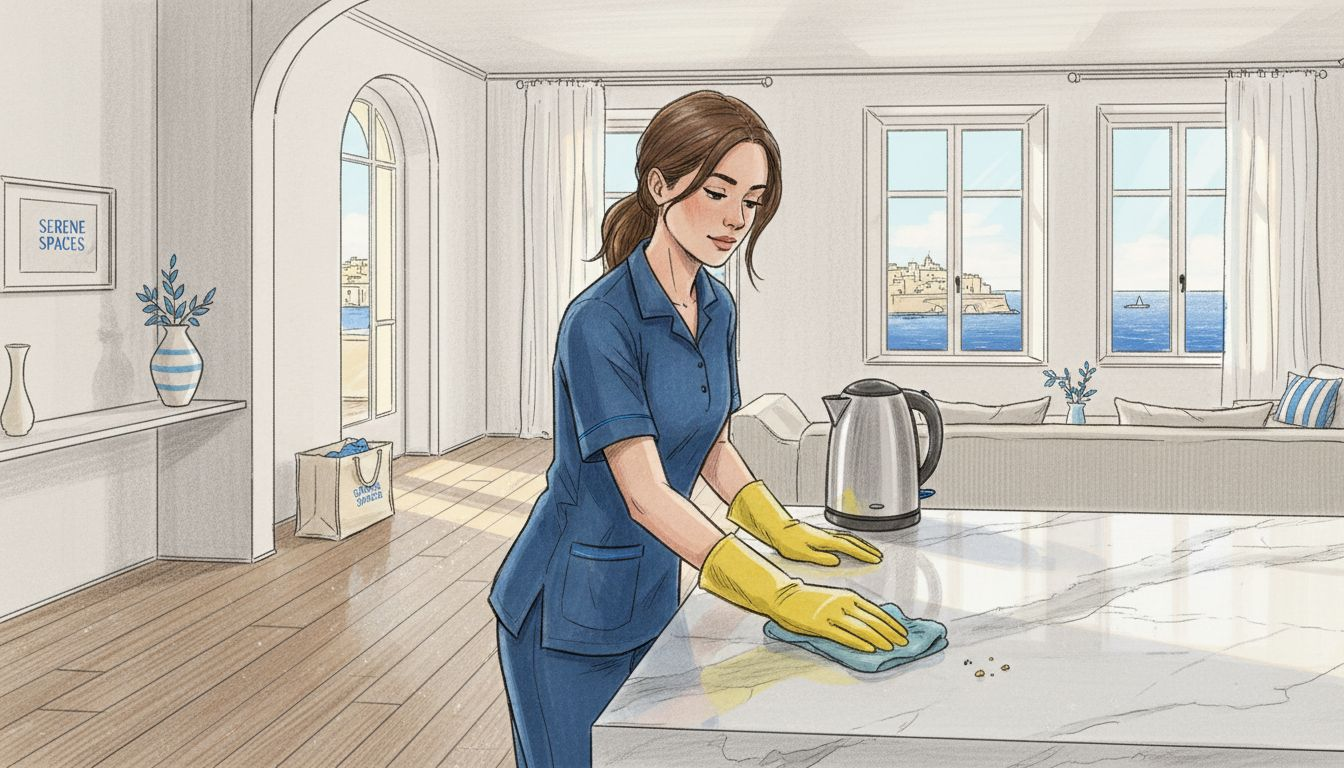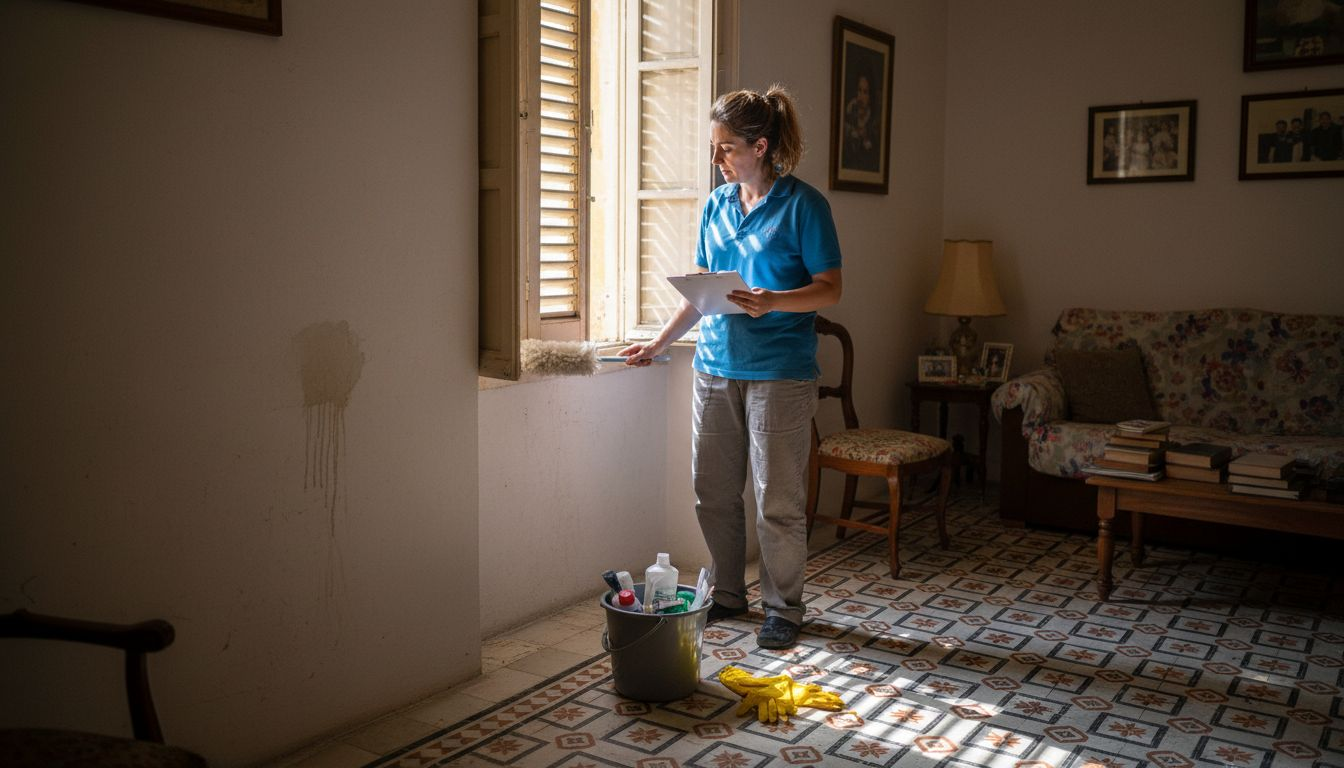Updated 26th of July 2025
Malta presents a vivid way of life, a sun-drenched Mediterranean climate, and a rich local culture. However, maintaining cleanliness amidst a hectic schedule can be a challenge. For the busy professional in a Valletta office, a family in a sprawling Mosta home, or a digital nomad in a comfortable Sliema apartment, professional cleaners in Malta have become indispensable for keeping surroundings clean, hygienic, and stress-free.
Watch how Rozie.app makes booking a cleaner in Malta easy
We go over the several cleaning services accessible in this extensive guide, explain why their popularity is soaring, and offer actionable recommendations for choosing the best cleaners in Malta. By the end, you will be ready to achieve consistent cleanliness in your spaces, freeing up more time to enjoy all that the Maltese islands have to offer.
Why Are Cleaning industry Growing in Malta?
The demand for professional housekeeping and cleanings in Malta is accelerating. This growth is fueled by a combination of social, technological, and economic factors.
Busy & Evolving Lifestyles
Maltese residents frequently find themselves juggling long work hours, family duties, and active social lives. The rise of the digital nomad community, attracted by Malta’s lifestyle and Nomad Residence Permit, has also introduced a new demographic of busy professionals who value convenience and time-saving solutions. Outsourcing cleaning tasks is a practical way to manage responsibilities effectively and reduce stress.
Digital Convenience & Smart Technology
The rise of digital platforms and mobile apps makes hiring professional cleaners straightforward, quick, and hassle-free. Modern services are integrating smart technology for efficient scheduling and communication, allowing for on-demand bookings and customised cleaning plans right from your phone.
Increased Hygiene Awareness
Recent global events have heightened the importance of cleanliness, sanitization, and hygiene. As a result, there is a higher demand for detailed and professional cleanins that can ensure a healthy living and working environment for both residential and commercial spaces.
Eco-Friendly Preferences
There is growing public awareness around sustainability, leading to increased demand for providers offering eco-friendly and sustainable products. Consumers are actively seeking companies that use non-toxic, biodegradable products that are safe for families, pets, and the planet.
Booming Short-Term Rental Market
With short-term rentals through platforms like Airbnb booming across Malta and Gozo, the need for rapid, reliable, and thorough turnover has significantly increased. A pristine property is crucial for securing positive reviews and maintaining a successful rental business.
Government Initiatives
Moreover, the Government of Malta is proactively improving cleanliness standards in public spaces, demonstrating a national commitment to overall hygiene and environmental quality that resonates with residents.
Benefits of Hiring Professional Cleaners
- Time and Energy Savings: Professionals handle intensive, time-consuming cleaning tasks, allowing you to focus on your career, family, or leisure.
- Better Health and Hygiene: A professional domestic cleaning provider can significantly improve indoor air quality, reducing allergens, mould, and harmful bacteria through the use of proper techniques and equipment.
- Stress Reduction: Maintaining consistent cleanliness ensures peace of mind. A tidy space reduces daily stress and removes the anxiety of unexpected visits from guests or clients.
- Superior, Professional Results: Professional cleaners utilize advanced equipment, commercial-grade products, and proven methods. Their attention to detail provides a level of cleanliness—a true deep clean—that is difficult to achieve with regular household routines.
- Reliable Scheduling: Scheduled cleaning appointments prevent last-minute cleaning rushes and help keep your home or office consistently tidy and welcoming.
Types of Cleanings available
Cleaning providers in Malta offer a wide array of services tailored to different needs.
Residential Cleaning
- Regular Cleaning: The perfect solution for ongoing upkeep. Includes routine dusting, vacuuming, mopping, bathroom sanitation, kitchen surface cleaning, and general tidying services.
- Deep Cleaning: An intensive, top-to-bottom service ideal for seasonal refreshes, post-renovation, or special occasions. This typically includes everything in a regular clean, plus cleaning inside cabinets and appliances, descaling faucets and showerheads, scrubbing grout, and cleaning behind furniture.
- End-of-Tenancy Cleaning: A comprehensive cleaning package designed to ensure a property meets the standards for the final inspection, helping tenants secure their deposit and landlords prepare for new occupants.
- Specialized Cleaning: Targeted services such as professional carpet shampooing, upholstery care, oven deep cleaning, and interior window washing.
Commercial and Office Cleaning
- Office Cleaning: Regular upkeep of workspaces, meeting rooms, washrooms, and common areas to ensure a professional, hygienic, and welcoming environment for employees and clients.
- Short-Let & Airbnb Cleaning: Fast, thorough, and reliable turnovers between guest stays, often including linen changes and restocking of essentials.
- Post-Construction Cleaning: Specialized cleaning to remove all dust, debris, and construction residue from a site after building or renovation projects are completed.
- Retail & Hospitality: Regular maintenance for shops, restaurants, and hotels, ensuring spaces remain attractive, safe, and welcoming to customers.
How to Pick the Best Cleaning Provider
Selecting the best cleaning provider in Malta involves more than just a price comparison. Consider these key factors to ensure you hire a reliable and professional company.
- Check for Vetting: A reputable company will have a thorough vetting process for their cleaners. Inquire about their process to ensure they hire trustworthy and professional staff.
- Read Recent Reviews: Look for testimonials on independent platforms to gauge customer satisfaction. Consistent positive feedback regarding reliability, thoroughness, and professionalism is a great sign.
- Service Flexibility and Checklists: Can the service be customized to your specific needs? Ask if they work from a checklist to ensure all your requirements are met consistently during every visit.
- Transparent Pricing: A trustworthy provider offers clear, upfront pricing without hidden fees. They should be able to provide a detailed quote based on your specific needs.
- Responsive Customer Support: Prioritize services with effective communication channels. Responsive customer support is crucial for accommodating last-minute requests or schedule changes.
Platforms like Rozie.app, Malta’s first on-demand cleaning app, simplify this process by offering quick booking, vetted cleaners, transparent pricing, and easy customer support, all in one place. By thoroughly evaluating your options, you ensure consistent and high-quality cleaning results.
Additional Tips for Keeping Your Space Cleaner
- Establish a Routine: Regularly scheduled professional cleaning maintains order and reduces the overall workload.
- Declutter Regularly: Less clutter simplifies the cleaning process and improves effectiveness. Adhere to the “one-minute rule”—if a task takes less than a minute, do it immediately.
- Use Doormats: Prevent dirt and grime from being tracked into your space by placing quality mats at all entry points.
- Eco-Friendly Spot Cleaning: For minor spills, opt for natural products such as vinegar, baking soda, and lemon to reduce environmental impact between professional cleans.
- Quick Clean-ups: Address spills and messes as soon as they happen to prevent them from setting and becoming harder to remove later.
Frequently Asked Questions
Do I need my own cleaning materials?
Most professional cleaners and companies provide their own equipment and supplies. However, if you have specific preferences (e.g., for delicate surfaces or allergies), you should communicate your needs beforehand. It is always wise to have basic cleaning supplies on hand, just in case.
How much does professional cleaning cost in Malta?
Pricing varies by provider and service type. In 2025, independent cleaners typically charge between €10-€20 per hour. Professional agencies often charge €15-€25 per hour. A deep clean may have a surcharge of 30-50% due to the intensive labour involved.
What’s the difference between regular and deep cleaning?
Regular cleaning is about maintenance—keeping your space tidy on a weekly or bi-weekly basis. Deep cleaning is a much more intensive service that targets built-up grime, soap scum, and dirt in hard-to-reach places that aren’t covered in a routine clean.
Is it safe to have cleaners when I’m not home?
Yes, provided you choose a reputable service. Professional companies vet their staff through background checks. This provides peace of mind and security, allowing you to return to a sparkling clean home without having to be present.
How do I pay for cleaning ?
Typically, cleaners accept payments through cash, bank transfers, or secure online transactions via specialized cleaning platforms.
What’s the minimum booking duration?
Most cleaning providers have a minimum booking duration of two to three hours to ensure a thorough and high-quality job can be completed.
How can I become a professional cleaner?
Cleaning platforms and companies usually require reliability, professionalism, attention to detail, and adherence to high company standards for prospective cleaners.
Concluding Thoughts
Hiring professional cleaners in Malta is an efficient and intelligent solution for maintaining cleanliness without stress. By delegating your cleaning tasks to trusted experts, you gain more flexibility, free time, and peace of mind. This allows you to leave the scrubbing and dusting to the pros and fully appreciate and enjoy your vibrant Maltese lifestyle.
Dont hesitate to contact Rozie if you have any questions.
Download Rozie today:

Aleksandrs Tuls
| Author & Co-Founder, Rozie
Co-creator of Malta’s first on-demand cleaning app, Aleksandrs distils real-world data into quick home-care hacks and business insights. Featured in Yahoo Finance.
Connect on LinkedIn.



